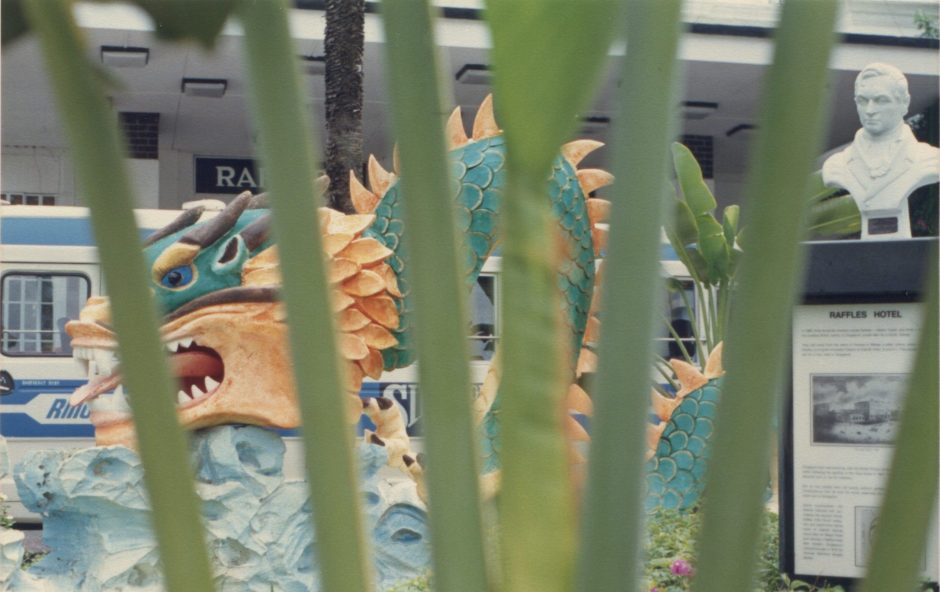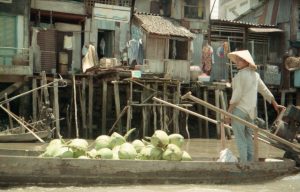I arrived in Singapore after being burnt in Jakarta.
And I had been told how dangerous it was but after six months of travel through already dubious locations I had become complacent.
The late-night bus from Bandung was just pulling into the Cililitan bus terminal. A short trip and I had the whole bench, rucksack above, day pack below. Normally I would have used the day pack as a pillow, but the bench was wooden and not cushioned. It could only seat two and it was not possible to lie across it.
Still, this time I was not thinking.
When the bus came to a stop at its bay the day pack was not there.
The first feeling was that this could not be. I was confused. Things do not go missing. Maybe it was up top, maybe it was in my rucksack. I looked up. The rucksack was still there. My money belt was still around my waist.
What was in the day pack? A camera, photo rolls, some notebooks. Damn! My passport and my wallet. What the hell were they doing in my backpack? It was too obvious.
I left the bus not knowing what to do. I walked up to a man who looked like an official. Fat and with a uniform, no baggage.
“I’ve been robbed,” I said.
He looked at me but did not understand.
“I’ve been robbed, someone has stolen my bag.”
I was getting worked up. I held out an imaginary bag, arm outstretched, and lifted it up and down like a dumbbell.
The bus station was small in reality. There were only a few people congregating because it was still early and the sun was barely up for the day, its watery rays peaking up, far side, over the roofs of the bus stop berths.
A large oil drum located in the centre was for garbage discarded by passengers who had just arrived, and after our bus had disgorged all its passengers, I looked in it to see if anything was there.
It was not.
At least not on the surface, and I thought better of digging through the leftovers of our roadside meals.
The robber must have hopped onto the bus just as we pulled in, it seemed more likely than him being one of the passengers. The permutations of when and how my day pack disappeared revolved around my head. The impossibility of the fact that my day pack had disappeared. Like it was impossible to comprehend that it would never again show.
I stood by the oil drum unwilling to move until something was resolved.
The bus I was on had left, the dark blue oil drum and me was it.
But I could not go anywhere without my passport. I would have to find the British Embassy and where was that exactly?
The foreman shuffled off, I did not know where. But I was not going to move because there was nowhere to go.
I stood there for more than an hour, like a lemon or some kind of irritant. The locals got fed up with me.
Especially the foreman.
It was disconcerting having a bule hanging around and creating a scene.
The foreman shuffled away one more time, sweated himself off in a huff, towards a glass cabinet of an office in the south west corner of the bus station. The sun had risen more now, and with the reflections off the window pane I could no longer see inside.
Fat flies fussed lazily on the edges of a styrofoam take away in the oil drum, the container split open to reveal the cold remains of nasi goreng and the shambles of hardened brown egg yolk.
I leant closer into the oil drum to shoo the flies away as if to, again, will my belongings back from the bottom of the pit.
Maybe it was my belligerence, because when the foreman next returned, he pulled at his trouser pocket, the pocket lining inverting with each tug, until he brought out a passport, my passport, its blue cover battered and a little soaked with grease from the thief’s disregard.
Like I had indeed succeeded in willing its reappearance.
Or maybe no one has a use for a British passport.
He found it in a garbage tip, the foreman said. He pointed to the oil drum.
Like hell.
No wallet or camera? I suggested.
But it was neither the wallet nor the camera that I cared about.
It was the pictures inside… Pictures of the boat to Java, the temples in Borobudur, the climb up Mount Merapi with the serious hikers, my friend not making it down the volcano without diarrhoea making its mark, us laughing about it.
But even the pictures were not the full story.
I had sent Angela C a postcard from Bali as promised but from Denpasar I headed west instead of east, missing out on the island of Timor, which I had originally targetted despite the local tensions with the East Timorese. I’d missed out on Komodo dragons, Irian Jaya, and even Papua New Guinea, a huge slice of South East Asia by-passed and neglected…
I stayed only three nights in Jakarta, an old colonial house with dark polished mahogany beams and heavy set matching mahogany tables and chairs that scraped the bare tiled atrium. The owner was also heavy set but he was meticulously dressed in a dark coloured sarong, batik shirt and traditional flat oval hat; he was also over-perfumed with an infesting alcohol intense cologne.
The man possessed an arrogant air, and every evening, he stepped out from his receptionist’s office and challenged anyone he could find, to chess because, it seemed, Jakarta was the centre of the world’s masters.
Sure enough, he seemed to beat me in ten moves every time, and told me it was a waste of time, my trying to beat him.
Nevertheless I’d had enough of Indonesia, the stultifying humidity of old town East Indies, the lugubrious canals that meandered through the city like sullen snakes, the in-your-face disparity of high walled wealth and sidewalk scraping poverty, the thick black sky with the perpetual threat of downpour; and even a rijsttafel spread couldn’t break my dark cloud mood.
I wanted out.
But by flying out of Jakarta instead of continuing by bus to the western point of Java I was also missing out on the jungles of Sumatra.
It was those jungles that I had in mind to explore when I had originally set off.
It was those jungles that I had in mind to explore when I had originally set off or, if not there, then points Northeast where, as a boy, I had dreamed of Look and Learn’s Borneo adventures in Sulawesi or Kalimantan.
And if it were not those jungles, then there were the points Northeast where I had boyhood imagined uncovering in Borneo (or Kalimantan).
The thing was, no one else was going to those places and I felt swayed by the cormorant crowd, the need to stay in its loose formed pack; though its influence ebbed and flowed, this time I felt its pull, felt slightly more shielded, especially after the vulnerability of a lonesome robbery.
At this critical point in time I was swept safely along with my fellow travellers following their clockwise flight through Indonesia, with the aim to go up and north through Malaysia and Thailand, whilst backing away from the lesser known outer edges.
I landed in Singapore, and man, it was good to scuttle back to a high-rise with the same dorms, the same breed of traveller, and the same curry options as Chung King, only cleaner.
That evening a group of us stopped at the Raffles Hotel for a Singapore Sling on the verandah, but those missed opportunities, and their ever-present regrets, still remain.
That evening a group of us stopped at the Raffles Hotel for a Singapore Sling and lounged beneath bamboo punkah wallah fans, aware that we’d become colonialists, no longer budget travellers, that we had been pretending to be embedded in the local life, that we were experiencing instead a falsetto, Rudyard Kipling like dichotomy.
Non, je ne regrette rien? If you really have no regrets, I soothed, then in that case, Vous n’avez pas vécu!
And yes, the regret of not travelling further afield, still remains.
Photo is of the entrance to the Raffles Hotel.
January 2023
Pitu. The Moon Dance Sembilan. 3 Continent Disease Conversations
